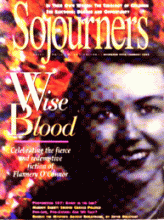In 1967, two veteran Washington, D.C. police officers confronted a slender African-American man crossing a street against the light-and helped launch a political career the durability of which astounds even seasoned political observers.
Officers Thomas Tague and Albert Catalano, patrolling D.C.'s Upper Shaw neighborhood, a center of black art and commerce in the 1940s and '50s, seized the lanky man for "disrespecting the uniform" and charged him with resisting arrest. In a press conference upon his release, the man-Marion Barry-vowed that the city's unrepresentative police force and the federal government's control of the District could no longer be tolerated.
In Barry's mind, such experiences allow him to identify himself with the movement for D.C. self-determination. He has come to fancy himself a Moses who came to bring his people into the promised land of true independence and sovereignty.
Barry came to D.C. in 1967, just ahead of many other civil rights workers. An organizer for the Student Nonviolent Coordinating Committee, Barry learned the ways of the streets even though he was not a product of them. Like other civil rights workers, he tried to use D.C. as a test case in the development of economic power derived from recent political gains. Barry saw the opportunity to combine the needs of the city with his own political self-interest.
Read the Full Article
